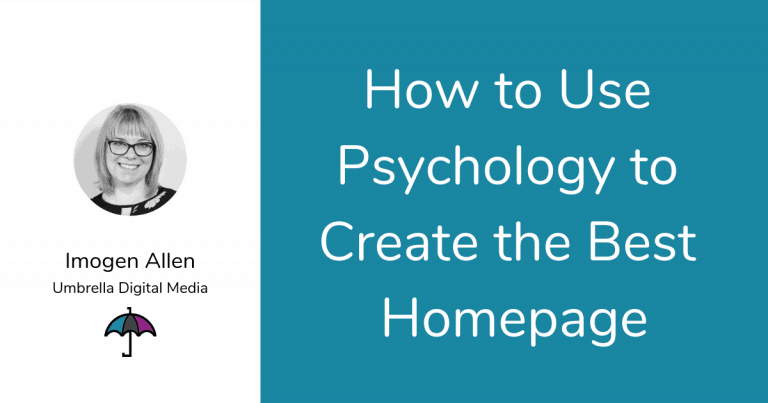In this fast-paced digital world, first impressions are made quickly. The homepage on a website has a very important job to do to capture the interest of a visitor to your site and keep them there. It’s crucial to have the right approach to create the best homepage to do this. The information presented must be quick and easy to find with clear signposting of next steps and involves as little brain power as possible for your homepage visitor.
This article examines the psychological elements to consider to make your homepage the best it can be.
How to Use Psychology to Create the Best Homepage
First Impressions Count
When we meet someone for the first time, it takes 7 seconds to make an impression of them. So many assumptions are made in those first few seconds that stay with us about that person. After that initial meeting, our initial impressions are hard to change.
Did you know that 55% of people spend less than 15 seconds on your website? This is a tiny amount of time for someone to make a decision about whether to stay or click away. That shows how important it is to have a clear and concise overview of what it is you do and who for.
Brain Power
The human race is wired to use as little brain power and burn as few calories as possible in processing information until it really has to. In the noisy online world, it’s hard to get through to Lazy Buyer’s Brains according to the Content Marketing Institute.
The brain’s function is to keep you alive and survive! It’s simply not going to get bogged down with heaps of useless information that is not relevant to the here and now. The simpler and more effectively you communicate on your homepage, the better.
If you confuse the reader with so much information, or give too many choices or just make things complicated, they just end up in a state of ‘analysis paralysis’ and take no action.
Your Website is Not About You
A homepage must present how your business can help solve the problem your web visitor has. This is the main focus of the homepage. It must be a guide to clients of a process (or a purchase) to help them get to where they need to be.
I often see websites where the focus of the homepage is on the business and its achievements, who they have worked with and how great they are. In all honesty, when someone visits your website, they are thinking about themselves and not about you.
Solving the Problem
When someone visits your website, it’s because they have a need or a problem that they want to solve. There are different stages of ‘awareness’ of a problem which can range from subliminal awareness to full crisis mode and acutely aware of the problem that exists.
The emphasis of the content within any website must focus on the benefits and solutions you can provide to a client to help them get through their ‘pain points’ and how you can help them to go through, over or around these obstacles and move them towards achieving the outcomes they want.
Why the Client is the Hero of Your Website
Donald Miller, from Building a Storybrand, tells us 5 Ways to Make Your Customer the Hero in Your Marketing Material and how the client is therefore always the hero of your website. The homepage must guide your client through a process which gets them nearer to where they want to be and to solve the problem that they face.
Think of it this way, the homepage is just the beginning of a client journey to the beginning of a plan for them. This plan becomes a series of actions that the client needs to take to move them forward, away from their pain point but nearer to their desired outcome and avoiding failure on the way. The truth is that the client will be focused on this and their interest in you beyond this will not necessarily be of interest to them. They will certainly have no recollection of what award you or your company may have won!
[bctt tweet=”People don’t buy products, they buy a solution to their problem.” username=”@umbrelladigia1″]
People think they know what their problem is but often it is actually different to what appears on the surface. Problems and difficulties internalise and make people feel a certain way.
They may feel frustrated, stressed, overwhelmed and unable to progress. The homepage content on your website must show how you understand the client’s problem and demonstrate empathy and understanding very quickly.
What is the Main Purpose of a Homepage?
- The homepage must move the web visitor on to a second page or to perform an action that moves them one step closer to becoming a client.
- The message on the homepage needs to be simple and easy to understand with clear signposting as to what the next step is and what action you want them to take.
- No prospective client wants to try and guess what action they need to take next and find it hard to do so. Make it as easy as you can for them and put yourself in their shoes.
How to Use Psychology to Create the Best Homepage
When you are in the planning stages of redesigning or creating your homepage from new, the key points to remember are: –
- First impressions count, you’ve got about 15 seconds
- Write for the Lazy Buyer’s Brain and keep your content and design simple and easy to follow
- The homepage is all about your potential client and not you, so put all those awards away
- The purpose of your business is to solve a problem your client has
- You are not the hero of your website, your client is
- People don’t buy products, they buy a solution to their problem
- Make it clear what action you want your web visitor to take, don’t give too many choices
- Remember less is MORE
If you are struggling with your homepage layout and need a sounding board, you can book a Strategy Hour with me where we can take a deep dive to get you clear on how you can make your client the hero.





